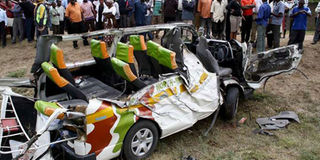Lack of manners to blame for Kenyans’ bad driving habits

The wreck of a matatu that was involved in an accident at St Mary's in Nakuru on February 9, 2016. Bad driving is to blame for accidents. FILE PHOTO | SULEIMAN MBATIAH | NATION MEDIA GROUP
What you need to know:
- Some believe that Kenyans’ lack of road etiquette suggests that they do not value human life — not just the lives of others, but their own as well.
- Thieves who hold big government positions are re-elected by the same people who suffer from lack of services because of their looting of public funds.
Many of my friends who travelled by road over the holidays complained about reckless drivers on our roads who flout every rule and place other travellers’ lives in danger.
This is not new, but it seems things have become worse on our highways.
We can blame badly placed road bumps or lack of adequate signage for this state of affairs but the truth of the matter is that Kenyans are among the worst and most ill-mannered drivers in the world.
Every day, I say a little prayer as I get onto the Lamu road towards Malindi Town because I am certain that a big speeding bus, a heavy-duty lorry or a tuk-tuk driver will try and overtake me at a dangerous corner or will push me off the road simply because the driver can get away with it.
Sometimes I worry about the motorists with their big fuel-guzzling SUVs who think that because they have an enormous vehicle they do not have to obey traffic laws.
I have been forced off the road by many of them.
And I always worry about the boda boda riders and cyclists in Malindi who never wear crash helmets and are known to ride their bikes at night without reflective jackets and even reflectors.
Some believe that Kenyans’ lack of road etiquette suggests that they do not value human life — not just the lives of others, but their own as well.
Are we a fatalistic society or have we become so dehumanised that we simply do not care whom we harm?
What, except insensitivity on the roads, can one expect from a matatu driver who has grown up in a neighbourhood where police killings, child abuse and other forms of violence are the norm?
What civility can one expect from a truck driver who has to regularly dish out bribes to traffic police officers at check points?
REPAYING EVIL
But how does one explain the Kenyan penchant for stealing from a dying or injured victim of a road accident?
What level of dehumanisation allows this kind of behaviour?
I believe that we are aggressive and bad mannered on our roads not because we are an inherently violent or badly behaved society; we bully other road users because bad manners and lack of respect for others are rewarded in our society.
People we look up to — including parents, teachers, religious leaders and politicians — do not inspire us to be better human beings; on the contrary, many set bad examples for us to emulate.
Think about the perpetrators of the post-election violence.
Has any one of them gone to jail or been stigmatised by their societies?
Thieves who hold big government positions are re-elected by the same people who suffer from lack of services because of their looting of public funds.
People who are honest, good, kind and compassionate are not rewarded in our society; in fact, they are viewed as naïve or stupid.
However, it is not just these social distortions that make us a retrogressive society.
We, Kenyans, also lack what is known as “a social contract” — an implicit unwritten agreement among members of a society to co-operate for the greater good, even if it means giving up certain individual freedoms.
This social contract is what makes people queue in line even when they are in a hurry.
It is what makes young people in buses or trains give up their seats to pregnant women and the elderly.
THE SOLUTION
Such a social contract makes societies gentler, kinder, more just and bearable and less hostile — for everyone.
It engenders trust, honesty and co-operation. It lends itself to good manners.
Societies that abide by a social contract are more likely to say “thank you” and “please” and to give way to other motorists.
Societies where such a contract is ingrained in people’s psyches are more likely to take a wounded accident victim to hospital than steal from him and then leave him to die.
The idea of a social contract was popularised in 16th and 17th Centuries by European thinkers who believed that, without such an agreement, society would descend into a hedonistic hell characterised by gluttony, violence and self-destruction.
Unfortunately, none of our social institutions — neither the family nor schools, religious institutions or the State — have been able to engender such a contract in Kenya.
That is why our roads remain amongst the most dangerous in the world.





